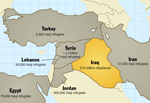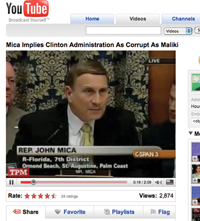The Forgotten

Photo by Getty Images
To the gallant paratroopers of the 82nd Airborne, Iraqi translator Hayder Hazim was a brother from the get-go. When they rolled out on their 4 a.m. patrols with the sound of Christina Aguilera blasting from the lead Humvee, Hazim rolled with them. And when he realized it was their only tape, the rap-loving Iraqi gave them Jay-Z, Akon, Fergie and Rihanna—a gesture that earned him the affectionate nickname “Homeboy.”
Of course, loyalty to Americans can be dangerous in Iraq. Still, even after anti-American extremists looted his house and tried to assassinate him, Hazim stuck by his friends in the 82nd.
One August night in 2003, Company C, 1st Battalion, was scheduled to train some new Iraqi police officers. On the way to the police station, a car bomb exploded in front of their convoy. The soldiers called in medical support, secured the road, picked up the trainees and headed on toward Dora, Baghdad’s most violent neighborhood.
There was another explosion. Bullets pelted like hard rain. A wounded U.S. sergeant tumbled from a Humvee, and Hazim began dragging him to safety. Then he, too, was hit.
“My leg exploded,” Hazim remembers. “Lt. Terry Brown carried me to the medic, who used his belt to stop the blood gushing.”
At first, Titan Corp., the U.S. subcontractor that hired Hazim, refused him medical coverage. So Army doctors treated him and made him a prosthetic leg. While he recovered, his buddies from Company C often visited. Hazim cherishes photos of the macho paratroopers tenderly holding his newborn son.
But when extremists attacked yet again, throwing a grenade into Hazim’s house, he and his family joined the estimated 2.5 million Iraqi refugees flooding across Iraq’s borders. The Hazims got to Jordan at the end of 2003 and applied for U.S. visas, dreaming of becoming Americans.
THE VISA MIRAGE
For refugees, the visa process begins with an interview by the United Nations High Commissioner for Refugees. One might think Hazim’s heroic record, college degree and excellent English would easily earn him a visa for immigration.
One would be incredibly wrong. Hazim waited almost five years, spending his life’s savings as he scraped together work.
He even had political connections.
Hazim’s father, an Iraqi attorney, was friends with Ronald Dwight, a Sullivan & Cromwell alum and former deputy director of Lawyers for Bush ’88 who is from Providence, R.I. The two had met in Baghdad, where they helped the Army investigate corruption among Iraqi officials and U.S. contractors.
A first interview by UNHCR is supposed to take place within two months. But many Iraqi refugees—even those who, like Hazim, have risked their lives working for Americans—often wait years. While they wait, whether it’s in Syria or Jordan or Turkey or beyond, they can be deported back to Iraq or robbed by corrupt officials or beaten by anti-American local gangs.
The UNHCR has deemed the Iraqi refugee crisis the worst in the Middle East in 60 years. Last year, the U.S. State Department says, 48,281 refugees were allowed into America. Only 1,608, or 3 percent, were Iraqis.
At the U.S. State Department, it is widely believed that a mass of Iraqi refugees coming to the U.S. would evoke images of the fall of Saigon and failed war, something the Bush administration would like to avoid.
Still, Dwight says, failing to aid Iraqis who’ve supported the U.S. would be a grave mistake. “Ignoring them sends a dangerous message to the world: Support Americans and we’ll abandon you to be killed,” he says.
But Iraqi refugees are beginning to get help from an unexpected source: American lawyers. They include students, solo practitioners and attorneys at global firms; supporters of the war as well as skeptics; Republicans, Democrats and everything in between—the first elements of a potential confederation of lawyers dedicated to helping these forgotten Iraqis.
When Mayer Brown e-mailed all its offices asking who would like to help Iraqi refugees, it expected about a dozen responses—80 lawyers immediately volunteered. Law students from Villanova and the University of Texas are helping Iraqi families through the labor-intensive asylum process.
For some, this pro bono ratio—150 lawyers to about 1,000 Iraqi refugees—evokes the words of Charles Bronson’s character in The Magnificent Seven when he’s asked to help defend a town against an attack by 40 outlaws: “I admire your notion of fair odds, mister.”
Still, even two-fisted litigators and veteran immigration attorneys can find themselves flummoxed by the process that has evolved around these Iraqi refugees. It is pro bono work that requires a special breed.
Iraqi refugees have no right to counsel, says Chris Nugent, a senior counsel at Holland & Knight who spent 3,000 hours last year helping Iraqi refugees.
“The U.S. State and Homeland Security departments don’t recognize attorney-client privilege. You can’t just demand information about your client. This work requires patience, a gift for forging relationships of trust within bureaucracies, and the ability to stay sane.”
The work also involves soaring joy and crushing despair—sometimes within the same hour. Lawyers know when a client trapped in Iraq stops responding to cell phone calls and e-mails, he isn’t playing nonchalant. He’s likely dead. They learn to focus on the saved.
Eric Blinderman, international litigation counsel for Proskauer Rose, represented an Iraqi translator shot in the face because he worked with the Army. Blinderman called the client’s cell phone and gave him the news his asylum was approved as the refugee floated past the Statue of Liberty on the Staten Island ferry.
“It’s like the fable of the starfish. Do you know it?” Blinderman asks, then relates it.
A father and his son see thousands of starfish stranded and suffocating on a beach. The boy grabs one starfish and flings it into the sea. His dad says, “That gesture doesn’t mean much in a disaster this huge.”
The son replies, “It meant everything to that one.”
Nugent, 40, organizes Holland & Knight’s pro bono work for refugees all over the globe. The Washington, D.C.-based lawyer says his life changed after meeting the man known as the Eliot Ness of Iraq.
Judge Radhi Hamza al-Radhi was appointed by the U.S. to head Iraq’s newly created version of the FBI. Radhi investigated about 3,000 corruption cases.
In one case, millions of dollars in cash and medical supplies had been donated to Iraq’s hospitals, yet Baghdad’s once well-respected Yarmouk Hospital was chronically short of life-saving staples: blood, saline, bandages and anesthesia. When doctors operated, orderlies had to hold down the conscious, terrified patients. Radhi discovered Iraq’s health ministry had been taken over by a religious militia, which stole the funds and sold stolen medical supplies to buy guns to be used against American troops.
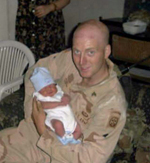
Photo courtesy of Hayder Hazim
He also uncovered criminal gangs teamed with Iraqi government officials and dishonest contractors, stealing oil pipeline supplies that were critical to Iraq’s economic recovery.
Radhi survived several assassination attempts, but 31 of his investigators were murdered. Investigators’ wives and parents were slain; one was tortured to death with a power drill.
RED CARPET ROLLED TIGHT
Iraq’s government responded by denouncing Radhi and firing him. Radhi asked the U.S. for asylum, but the U.S. government’s reception hasn’t been much warmer.
Radhi and his family came to America last year. He told his story to the House Committee on Oversight and Government Reform, but committee Republicans proved unimpressed. Hearing details of Radhi’s investigations, Rep. John Mica of Florida scoffed that corruption is a problem “in just about every democratic society.”
“I’ve got, sort of, the record from the Clinton administration,” Mica said, including that it had “the most number of witnesses to die suddenly.”
Nugent soon met 27-year-old Kirk Johnson, an Arabic speaker and aspiring lawyer now based in New York City who had volunteered to work in Fallujah for the U.S. Agency for International Development. Johnson had formed close friendships with Iraqi co-workers, and back in the States he began compiling a list of Iraqis in grave danger because they had worked for U.S. governmental agencies, contractors or troops.
Johnson’s database, which has swelled in time to nearly 1,000 names, lists each Iraqi’s birth date, phone number and e-mail, as well as contact information for American supervisors. Most importantly, it includes death threat summaries. “I’ve given the list to so many State Department officials so many times; they keep losing it,” Johnson says, exasperated.

Hayder Hazim.
Photo by Ron Aira
The Iraqi Ministry of Displacement and Migration estimates at least 30 percent of all professors, doctors, pharmacists, nurses, computer technicians, electricians, construction workers and engineers in Iraq have fled since 2003. Christian, Baha’i and Jewish Iraqis have fled Islamic extremist militias. Professionals and skilled craftsmen have been targeted. It’s difficult to know whether they are being kidnapped and murdered by criminal gangs or religious fundamentalists who detest the modern world. To the victims, it is a point exceedingly moot.
Johnson’s list does not include Iraqis persecuted for their Westernized professions or religious faith. “My heart aches for those people, but it would be overwhelming and even more unmanageable,” Johnson says. “The list has to be only for Iraqis employed by Americans.”
In March, U.S. Ambassador James Foley, senior State Department coordinator for Iraqi refugee issues, was telling Rep. Gary Ackerman, chairman of the House Foreign Affairs Subcommittee on the Middle East and South Asia, it would take months to compile names of former Iraqi employees. As he did so, the New York Democrat’s staff placed stack after stack of folders in front of Foley. Each folder contained the complete file of an Iraqi on Johnson’s list.
Ackerman has noted that Gerald Ford had 160,000 Vietnamese refugees processed in just six months, and 50,000 Kosovo refugees were processed in the same time frame during Bill Clinton’s presidency. Yet Iraqi refugees frequently wait years for UNHCR and State Department interviews.
BROKEN TIMELINE
No one argues against extensive security checks for refugees before they enter America, but hundreds of refugees on Johnson’s list have waited years to finish a process then-Assistant Secretary of State Ellen Sauerbrey told Congress should take 10 months maximum.
A year later, Nugent is still trying to win asylum for Radhi. The judge, his family, his security chief and the chief’s family live in a donated house—and on the charity of Holland & Knight attorneys and Radhi’s former State Department colleagues.
In that first critical interview with the UNHCR, registered refugees must explain why they are fleeing Iraq to establish what is called a “credible fear.” In Johnson’s list, a simple color-coded Excel file, tragedy and loyalty spill down a column next to telephone numbers and e-mail addresses, spelling out life and death (names have been deleted here to protect the refugees).
• “U.S. Army captain says of interpreter X: ‘I would fight to have Mr. X on my team. His hard work, dedication, loyalty are second to none.’ X, his wife and children were in a taxi when insurgents chased them, shooting. Taxi overturned. X’s infant son suffered a fractured skull and brain injury. Now 2 years old, the little boy cries often and begs siblings to ‘press his head’ to make the pain go. U.S. doctors say the child will die without proper medical care.”
• “In an ambush, two of my fellow interpreters were killed before my eyes. I was wounded. Then my fiance was kidnapped. An insurgency group showed my fiance, handcuffed and kneeling, on Iranian TV. They sent me a video of his beheading.”
• “Worked for FedEx and endured severe injuries after being kidnapped by militia. Thrown out of a speeding car but lived (after 6 months in a hospital). Returned to work. Was again kidnapped by militia and tortured (documentation enclosed). He was ordered by a militia court to pay $20K ransom. Glowing recommendation letters from supervisors.”
Nugent chose the father with the injured toddler as top priority. “It’s a subjective decision,” Nugent sighs. “Anyone listed deserves urgent help from America.”
While Nugent aids refugees who fled Iraq, Blinderman works with those trapped inside the country. Until this March, Iraqis were not allowed to apply for American visas in Iraq. Even Iraqis who worked at the U.S. Embassy had to flee to another country to apply.
Blinderman knows the drill. He risked his life in Iraq to advise the judges overseeing Saddam Hussein’s trial. (See “Rough Justice,” May 20074.) Now he helps former colleagues escape death squads.
And he tries to have a life. “As an attorney, you have to compartmentalize or you will be crushed by the endless wave of human tragedies pouring from Iraq,” he says bluntly. Blinderman, 34 and based in New York City, manages the legal affairs for Mas, a trendy Manhattan restaurant he co-owns. Sometimes he catches South Park and The Simpsons, and he “gets serially dumped by girlfriends,” he quips ruefully. “One gets fed up with my schedule, dumps me; then the next gets fed up—well, you get the idea.”
Nugent and Blinderman counsel Iraqis by cell and e-mail, sometimes using code in case a militia is monitoring a refugee’s communications. A militia or gang can get the hardware to trace communications for about $50,000.
They gather mountains of paperwork for each client. An Iraqi refugee needs a letter from the chief of mission confirming his work with coalition forces. Those chiefs are now scattered across the globe, so the lawyers track them down. They collect recommendation letters, documentation of torture and death threats, letters from Iraqi police captains confirming their clients have no arrest record.
Blinderman employs an array of legal stratagems to help his clients: He got an academic fellowship for an Iraqi judge. He gets medical visas or humanitarian parole for former translators who’ve been severely wounded in ambushes. Whatever works.
Blinderman, Johnson and Nugent ordinarily sound gentle and optimistic. But when they tell a tough truth, each of them delivers it in the same flat, clinical voice. It’s a voice a doctor might use to say, “You have cancer. You’ll be dead in a few weeks.”
Some of Blinderman’s clients become frantic after they escape because a parent or sibling in Iraq is deathly sick. They feel guilty for not coming out of hiding to help.
“The way my clients can convince the world that they are refugees is with living proof that they fear for their lives,” Blinderman says in that voice. “Typically, a UNHCR interviewer will ask an Iraqi if he would go back to Baghdad to help his dying mother. The only correct answer is no.”
LIBRARIAN IN LIMBO
At 23, the refugee we will call “Mike” has gone through life changes that make Peter Parker’s transformation into Spider-Man seem tame. A librarian at a Christian school before becoming a U.S. Army translator, he is faced with superhero-size peril. Mike is now on Johnson’s list and still seeking safe harbor.
He honed his language skills translating American novels and Shakespeare into Arabic for student discussions. When he went to see Mel Gibson’s The Passion of the Christ, Mike didn’t need subtitles to understand the Aramaic—he reads and writes the ancient language.
When the Americans arrived, he was swept up with poetic visions of democracy. He became a translator for the 101st Airborne Division. The soldiers admired Mike’s talent and trustworthiness. They assigned him to translate manuals, charts and classes for American officers training Iraqi recruits at Mosul’s new police academy.
But insurgents murdered the Mosul police commander. Car bombs killed dozens of cadets. In 2004, anti-American extremists attacked all of Mosul’s police stations, slaughtering officers. Mike stayed on the job, despite death threats—threats made because of his work with Americans and because of his Christian faith.
Then the militias began pursuing his family. Mike and his brother are goldsmiths, as were their ancestors for hundreds of years. They sold their small jewelrymaking business and used the money to take their widowed mother to Syria.
Most Iraqis must be referred for resettlement by a UNHCR interviewer—a life-and-death decision entrusted, in essence, to the agency’s local employees.
Mike says his Syrian UNHCR interviewer handed him a folder emblazoned with “Not eligible to resettle” for his paperwork. The interviewer was scornful of Mike’s work with Americans. Other refugees on Johnson’s list have accused UNHCR’s Syrian staffers of mocking Iraqi refugees as “America’s dogs” and, more seriously, of leaking Iraqi refugees’ whereabouts to militias.
WEARING A TARGET
Shortly after his interview, mike says, he got a grim phone message from the militiamen he was fleeing: They knew his location. Mike moved his family to Turkey, where the UNHCR office is headed by an American.
“We hear serious complaints from refugees all the time about Syria and sometimes Jordan,” UNHCR senior resettlement officer Larry Yungk says carefully. “These complaints are investigated by [UNHCR headquarters in] Geneva. In some cases, DHS investigators have teamed up with Geneva. That’s all I can say.”
The U.S. does not have diplomatic relations with Syria and has denounced Damascus for supporting terrorists. Yet Syria has allowed some DHS circuit riders in for refugee interviews. No one wants to damage that fragile entrée.
Nugent got Mike’s file transferred from Syria to Turkey, but Mike has waited months for the UNHCR to respond to his repeated requests for an interview. He says he does not have money to pay for a dentist to treat a toothache plaguing him. When an American colleague asked what he would like for his birthday, his only request was aspirin.
When his family runs out of money, they will be homeless. And as his 23rd birthday approached in May, he wondered if he would make it to 24.
“I had dreamed of inviting my American soldier and academy friends to my wedding one day in Iraq,” he writes in an e-mail. “I wonder if the only life I will have is as a memory in the mind of whatever friends of mine survive this year. An unknown future feels like a destructive weapon.”
Still, he polishes his English language skills reading paperbacks: James Joyce’s Dubliners, Rudyard Kipling’s poetry and an English dictionary. At an Internet café, he applies online for translation jobs. He volunteers to translate visa applications for other Iraqi refugees and is writing his family history—in English.
Despite his harrowing experience, Mike is still a kid. He was elated by an American’s treat of cobalt-blue Peeps and apple Pop-Tarts at Easter. He loves learning about baseball and Satchel Paige.
“One of the things that keeps me from despair is knowing that, however the U.S. government acts, there are wonderful Americans who care about me,” Mike says.
IT TAKES A VILLAGE
Villanova law professor Michele Pistone believes she first noticed the phenomenon over two years ago: Iraqi relatives pooling their resources to give money to one family with children. That family flies to Mexico. There they trek across the desert to the U.S. border, where they are arrested and request asylum.
“One case that haunts me—two brothers who owned water trucks,” Pistone says. “They were ambushed. One brother was shot in the neck, paralyzed, trapped in a wheelchair in Iraq the rest of his life. He gave his savings to his brother who had two small children and a shot of making it to America.” That brother was successful in getting to the U.S.
Some of these asylum-seeking families end up in the Berks County Shelter Care facility in Leesport, Pa., one of only two family detention centers in the U.S. Pistone’s students represent some of the Iraqi families there.
The other facility is in Taylor, Texas—the T. Don Hutto Family Residential Facility, a former prison named after one of the founders of the Corrections Corporation of America, the private firm that operates it.
In Texas, even Iraqi families not on Johnson’s list have a chance to be represented by Matt Pizzo, 25, a recent graduate of the University of Texas law school who has yet to lose an asylum case.
Pizzo, who recently accepted a job with a Texas immigration court, first began to represent Iraqis as a UT law student, volunteering about 40 hours per week at the school’s immigration clinic. He’s uncertain how he came to represent Iraqis.
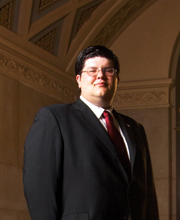
Matt Pizzo.
Photo by Christine Reilly
“Maybe I was assigned Iraqi families primarily because I wasn’t quite confident enough about my Spanish to represent Mexican and Central American asylum seekers,” Pizzo says.
The families he first represented as a student were required to wear orange prison jumpsuits to attorney interviews and asylum hearings. “Even the little baby had an orange jumpsuit—someone at Hutto cut the cloth to fit him,” Pizzo marvels.
To get asylum, a client must prove he is persecuted for race, nationality, political opinion, social group (such as religion), sex or sexual orientation.
Many of his clients were Iraqi Christians, particularly Chaldeans. Since the U.S. invasion, Anglicans in Baghdad have seen most of the men in their congregation murdered along with the lay pastor, his wife, the youth minister and the music director. Iraq’s Catholic archbishop was kidnapped and murdered in March.
Pizzo learned that there was a large Chaldean community in San Diego. He soon had Chaldean priests across America on speed dial—including the president of the Chaldean Federation of America—who could quiz his clients about their religion. The priests could then write statements testifying that Pizzo’s clients were believers, not poseurs.
Asylum is a laborious process of collecting affidavits and evidence of persecution—everything from witness testimony to 60 Minutes transcripts. DHS hearings ran the gamut: Some DHS officers seemed very sympathetic to Pizzo’s clients; others were confrontational, frazzling the judges and terrifying his clients. One judge snapped at a client who spoke a little English for having required a court translator.
But in the end, clients were carried to safety on Pizzo’s meticulous collection of evidence.
His clients told stories more fascinating than any movie blockbuster: A fixer in Istanbul charges about $10,000 to get passports for a small family. A car or house is sold for gold instead of dinars so the family can buy food and passage across continents.
“I’ll never be a gunner,” Pizzo laughs, referring to slang for law students whose hands snap skyward for every question. “Gunners love dissecting minutiae. Truthfully, my cases and the law they involve were more exciting.”
One Chaldean family, former clients, invited Pizzo to their new home in Las Vegas to celebrate his graduation. They made stuffed grape leaves, kebabs, hummus with figs and rosewater, and saffron-scented cookies.
On one wall a picture of Jesus was surrounded by photos of family members at weddings, high school and college graduations, christenings and birthday parties. Pizzo’s heart filled with sadness when he realized the wall was a tribute to relatives who had been assassinated.
“It was as if in the middle of the party, the room was filled with ghosts,” Pizzo says softly.
WITH ‘THE ANGELS’
One of Nugent’s Iraqi clients, “Bob” (who asked that his name not be used to protect his still-endangered family), grew up loving the TV show Eight Is Enough. He is steeped in U.S. pop culture and speaks flawless English. Bob envisioned American streets clogged with “angels” like Gwyneth and Angelina.
USAID hired Bob as procurement manager for the U.S. Embassy. And Bob sent his young Iraqi staff into the Baghdad markets to buy anything staffers demanded, from a hamburger to a photocopier to an elusive “extra wide toilet seat.”

Dina, Ali, and Hayder Hazim.
Photo by Ron Aira
If a militia or insurgent realized the purchases were for the embassy, the buyer could be kidnapped, tortured or killed.
“Some American political appointees seemed to be there to improve their careers or credit ratings and did not care about Iraqi lives,” Bob recalls. “One woman screamed at me because I hesitated to send one of these brave, beautiful kids to buy her a low-fat yogurt. But the only market that sold low-fat was on a street hit constantly by car bombs and kidnappers.”
One day, a militia confronted Bob, telling him he would be beheaded with a meat saw if he did not leave. The militia had recently beheaded an innocent man with a meat saw. Bob left Iraq.
He was arrested and tortured in Egypt, where he had sought safety. In a tiny cell jammed with refugees, Bob wept listening to guards torture a Somali teenager. And he reluctantly began to believe that angelic America had abandoned him.
“I see the morning as another sign of God wanting me to suffer another day,” Bob told a detained friend. That friend got out and contacted Johnson for help.
“Kirk and Chris are described as two stubborn Americans,” Bob said later. “Don’t you love stubborn Americans when they’re being stubborn to save you? The angels are dressed in suits, just like Chris.”
Now Bob is Blinderman’s paralegal. The two have gotten visas for 43 Iraqis so far. When they win asylum or a visa, Bob says, “We saved a soul today.”
HOME AT LAST
One such soul is “Homeboy” Hazim. after five years of waiting, he and his family were finally given U.S. visas; they landed in Roanoke, Va., in April.
Their first day in America, Hazim and his wife sat at the window and watched the people strolling, the wind ruffling the flowers and trees, as if it were all an incredible movie. Several of Hazim’s 82nd buddies phoned to invite him to a Fort Bragg, N.C., reunion. Roanoke’s Channel 10 TV news taped a segment on Hazim, and the city embraced him.
“The manager at the 7-Eleven on my block is like a good friend now,” Hazim says shyly. “Ladies from all over the city take my wife sightseeing. I was worried how people might react to my leg. But the only thing anyone has done is thank me for helping America. These wonderful people make me feel reborn. And my son is becoming so American.”
Still, there are moments of fear and confusion. In Baghdad and Jordan, militias and secret police often announced their arrival with a siren. The Hazims taught their son, Ali, that when he heard a siren, he must hide.
Their new Roanoke home is on the same block as a fire station. And when he first heard fire trucks blasting by their house, Ali, now 5, would take cover under the bed in his room.
Hazim took Ali to the fire station.
The firemen lifted Ali onto the huge trucks, joked with him and posed for photos. He watched Ali’s fears evaporate as a new band of brothers doted over him.
And “Homeboy” Hazim felt at home.
Sidebar
POLITICAL PRICE
Politics—national and global, even personal—can shape an Iraqi refugee’s fate.
While Iraqi translator Hayder Hazim was striving for a visa, Ronald Dwight called the U.S. Embassy in Jordan to recommend him for a job. The embassy never responded.
“I made the Bush administration mad in 2004 because I got Republican appointees in Iraq fired—they were idiots,” says Dwight, an attorney and economist from Providence, R.I., who once led the national Lawyers for Bush group in 1988.
Then there are the legal hurdles. And, of course, the paperwork.
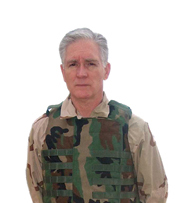
Ronald Dwight.
Photo courtesy of Ronald Dwight
“Between 2003 and 2006, Iraqi refugees could not get into the United States—even if they were in danger for supporting Americans,” says Larry Yungk, senior resettlement officer for the United Nations High Commissioner for Refugees in Washington, D.C.
“Refugee resettlement is like the tax law or immigration law: Everything is based on legislation and regulations that can change.”
Until recently, the State Department would accept only Iraqis referred by the UNHCR for possible resettlement. UNHCR interviews take months to handle.
“Interviewers take down refugees’ information on paper; then all that paper is sent to Cairo for inputting into computers,” says Lori Scialabba, a Department of Homeland Security associate director overseeing Iraqi refugee issues. “Cairo is the place in the region with enough technology and staff.”
But policy, not technology, seems to be the main hurdle. U.S. Rep. Gary Ackerman, D-N.Y., is a House Foreign Affairs subcommittee chairman and a tough analyst of the crisis. He was appalled by testimony last year that the Department of Homeland Security forbids visas to Iraqis who pay ransom for kidnapped relatives. DHS regards ransom as support to terrorists.
Ackerman argued the rule violates federal law, and DHS has begun exempting Iraqis from the ransom rule on a case-by-case basis.
“Active U.S. military and the Iraq and Afghanistan Veterans of America have referred client after client to us,” says Sali Rakower, a New York City-based associate at White & Case who helps Iraqi refugees pro bono. “U.S. soldiers paid expenses for Iraqi colleagues, lobbied Congress. Soldiers opened their own homes back in America to house former interpreters. Our troops do so much while our government has done so little.”
AT STATE, A FEW SMALL STEPS
James Foley was appointed the State Department’s senior coordinator of Iraqi refugee issues last September as the war in Iraq neared the end of its fourth blood-soaked year and State and the Department of Homeland Security bickered over how to process Iraqi refugees. Foley and his DHS counterpart, Lori Scialabba, were charged with getting their agencies on the same page.
“Before the Iraqi crisis erupted with the [February 2006] bombing of the Samarra mosque, there was no groundwork for processing refugees in the Middle East—just a few small UNHCR offices that referred few refugees for resettlement,” Foley says. “When I came on board last fall, the first task was accelerating U.S. interviews of cases already referred by UNHCR and convincing the Syrian government to allow the resumption of DHS interviews of Iraqis in Syria.”
Both his agency and Scialabba’s had to find office space and hire local staff. Foley says a breakthrough occurred this May when a staff member volunteered to take the job of refugee coordinator in Baghdad—a permanent position. Iraqi translators and certain others who would be murdered if they tried to make it to the border can come to the Green Zone and complete almost the entire visa application procedure.
“Sen. Edward Kennedy’s 2008 legislation regarding Iraqi refugees allowed us to create that position,” Foley says.
Before the staffer departed for Baghdad, he met the Massachusetts Democrat, who thanked him for his heroism.
HOW TO HELP
To offer pro bono counseling, tax-deductible donations or resettlement assistance (housing, jobs) to help Iraqi refugees, contact:
Kirk Johnson
P.O. Box 502,
New York, NY 10101
888-895-5782
Capt. Jason Faler
P.O. Box 901
Salem, OR 97308
503-871-3238

